What’s next for the traffic-clogged 605 Freeway? Maybe toll lanes
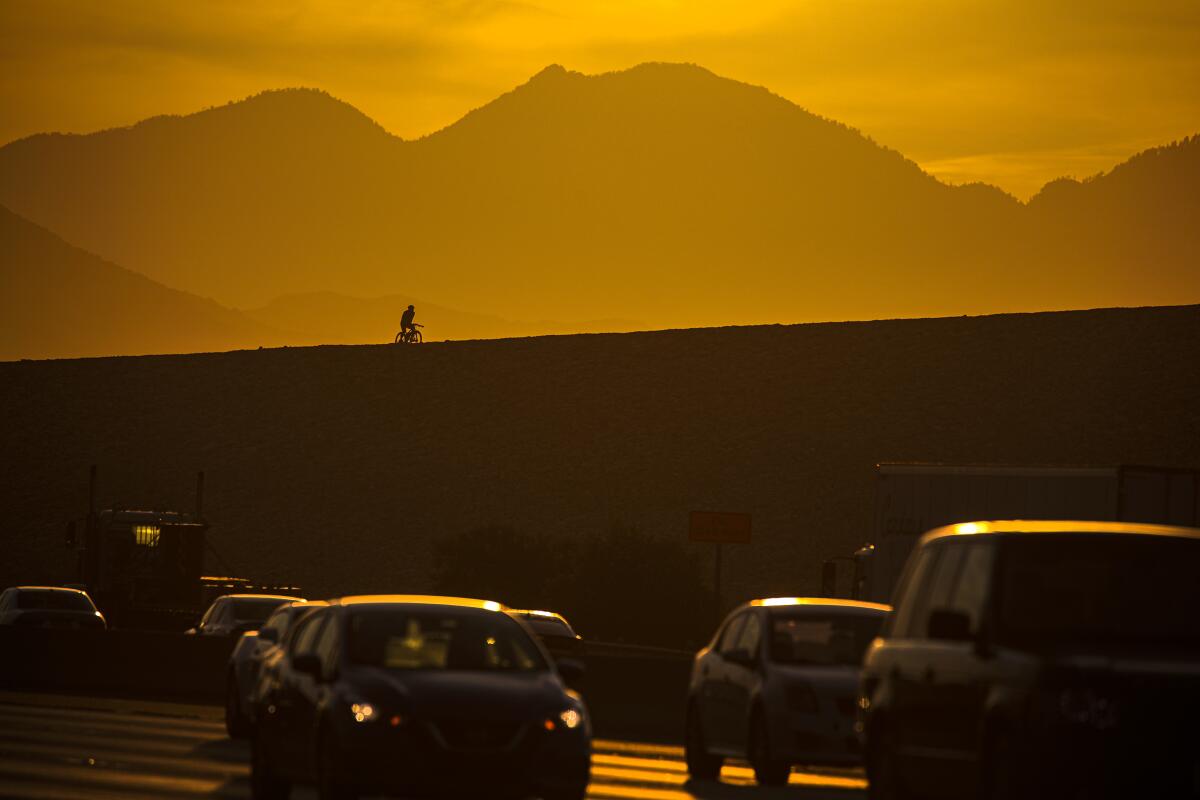
Good morning. It’s Friday, July 19. Here’s what you need to know to start your day.
- Would toll lanes alleviate traffic on the 605?
- Trump accepted the Republican nomination in a very long speeh.
- ‘Twisters’ is chasing a blockbuster storm of yesteryear.
- And here’s today’s e-newspaper
You're reading the Essential California newsletter
Our reporters guide you through our biggest news, features and recommendations every morning
You may occasionally receive promotional content from the Los Angeles Times.
Metro retooled a freeway expansion project. Community advocates are still skeptical
Breaking news: Driving L.A. freeways is the worst.
For decades, the county’s transportation agency has floated projects it said would alleviate traffic congestion by widening freeways. But, spoiler: They haven’t helped. And as criticism and scrutiny of those projects mounted, the agency scrapped some of its plans.
Others, like the 605 Corridor Improvement Project, have been reworked.
L.A. Metro officials frame this as a dramatic shift in how they approach freeway work, emphasizing communities’ mobility and environmental needs above moving cars more quickly. But local freeway critics are skeptical, arguing that adding more lanes just adds to our congestion and environmental woes.
First, here’s a little background on the initial project and what’s different now.
The project was first proposed in 2020, covering roughly 15 miles of the 605 Freeway from Baldwin Park to Norwalk. Work is also proposed for segments of the 10, 60, 5 and 105 freeways that cross the 605.
For the record:
3:21 p.m. July 24, 2024A previous version of this newsletter said that the 605 Corridor Improvement Project included work on a segment of the 101 Freeway. It’s actually the 105 Freeway.
Initially, Metro’s concepts included adding new general purpose lanes. To do that, planners said the agency would have to “acquire” up to 380 homes, businesses and other properties along the freeway, displacing hundreds if not thousands of people.
As you might guess, seizing homes in low-income communities to make way for freeway lanes is not a popular idea and harks back to the racist legacy of U.S. freeways.
Opposition was swift and vocal, aided in part by the social justice reckonings that spread after the murder of George Floyd. The plan was shelved in 2022 as Metro leaders sought to retool the agency’s freeway projects.
What’s different now?
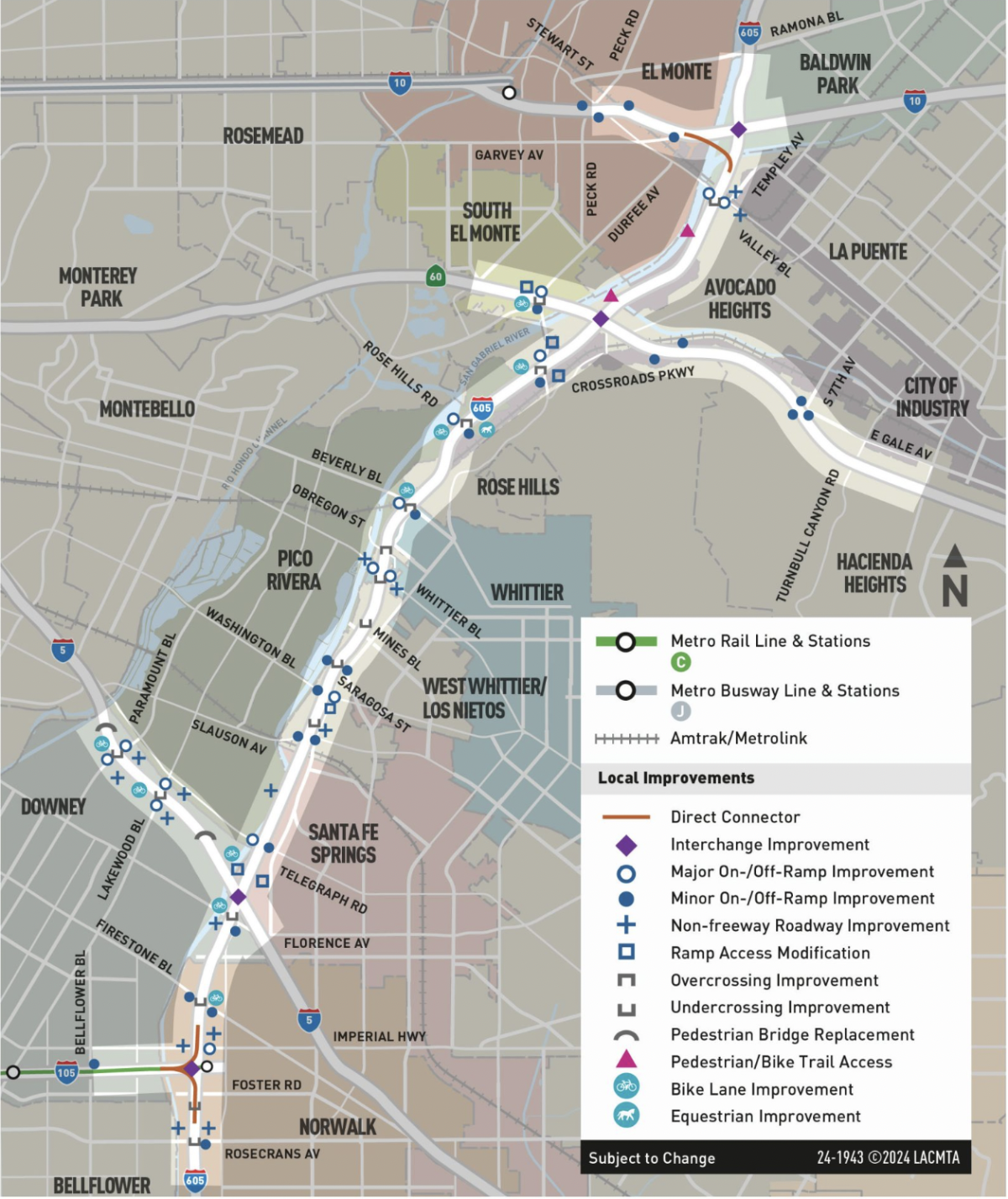
Metro’s updated concepts scrap adding more general purpose lanes and explore other options for the 605:
- Convert the existing HOV lanes to ExpressLanes and widen the inner shoulder, or
- Convert the existing HOV lanes to ExpressLanes and add a second ExpressLane in each direction, or
- Keep existing HOV lanes and add another HOV lane in each direction
The plans propose modifying many on- and offramps to the freeways, plus “minor street widening and intersection improvements to improve traffic circulation.” The concepts also include pedestrian safety upgrades, better access to public transit and possibly improved bicycle access on surface streets near freeways.
According to Ray Sosa, Metro’s chief planning officer, the focus now is on “multimodal improvements” that emphasize safety “while moving more people and not necessarily cars.”
If you’re counting, that was three concepts. The other alternative is to build nothing and keep the freeways as is.
The change of highest interest: Metro now says its goal is to “avoid residential displacements” by keeping the project “mostly within” state-owned property. However, the agency also says that “some partial acquisitions might be needed.”
I asked Metro about that. Sosa and project manager Carlos Montez said some homes through the corridor may border an existing freeway ramp, sound wall or other related infrastructure. The project could potentially call for encroaching on their property space. Sosa added that, should the environmental study be reauthorized, “we would continue to refine the project to try to eliminate those partial acquisitions.”
Will it work?
We’ve explored freeway widenings before in this newsletter. They don’t actually reduce congestion long-term, studies and our own hellish commutes show.
Experts argue that adding more lanes hasn’t made driving L.A. freeways any easier, because more lanes just encourage more driving. And creating more space for cars to crawl means more harmful pollutants spewing from vehicles’ tailpipes and tires, making the region’s air even worse — especially in the low-income communities of color our freeways run through.
But Metro officials are hopeful this time will be different — if they can get enough drivers to pay for a quicker commute or make fewer car trips in favor of bikes, trains and buses.
Sosa pointed to the ExpressLanes on the 10 and 110 freeways as an example of the potential. According to Metro, those toll lanes improved travel speeds for those who opt to use them and generated more than $100 million over 10 years to fund transit enhancements and other mobility improvements in the surrounding communities.
“That’s kind of what’s envisioned here,” he said.
Experts say that charging drivers to escape soul-crushing traffic on high-demand roads — known as congestion pricing — is the only proven way to actually improve traffic.
“You pay a toll and you save a bunch of time,” Michael Manville, a professor of urban planning at the UCLA Luskin School of Public Affairs, told me last month. “And you can have more of that.”
Well, the 605 project could bring more of that. But driving less has proved to be a tough sell in car-centric L.A., especially for communities that lack public transit options.
Alex Contreras, a housing and transportation advocate, said the historical focus on freeway expansion has created “a public transportation desert” in southeast L.A. County and trapped people into car dependency.
“We’re also shooting ourselves in the foot because we are experiencing a housing crisis,” they said. “We need to be focused on how we can bring transportation to where the homes already are.”
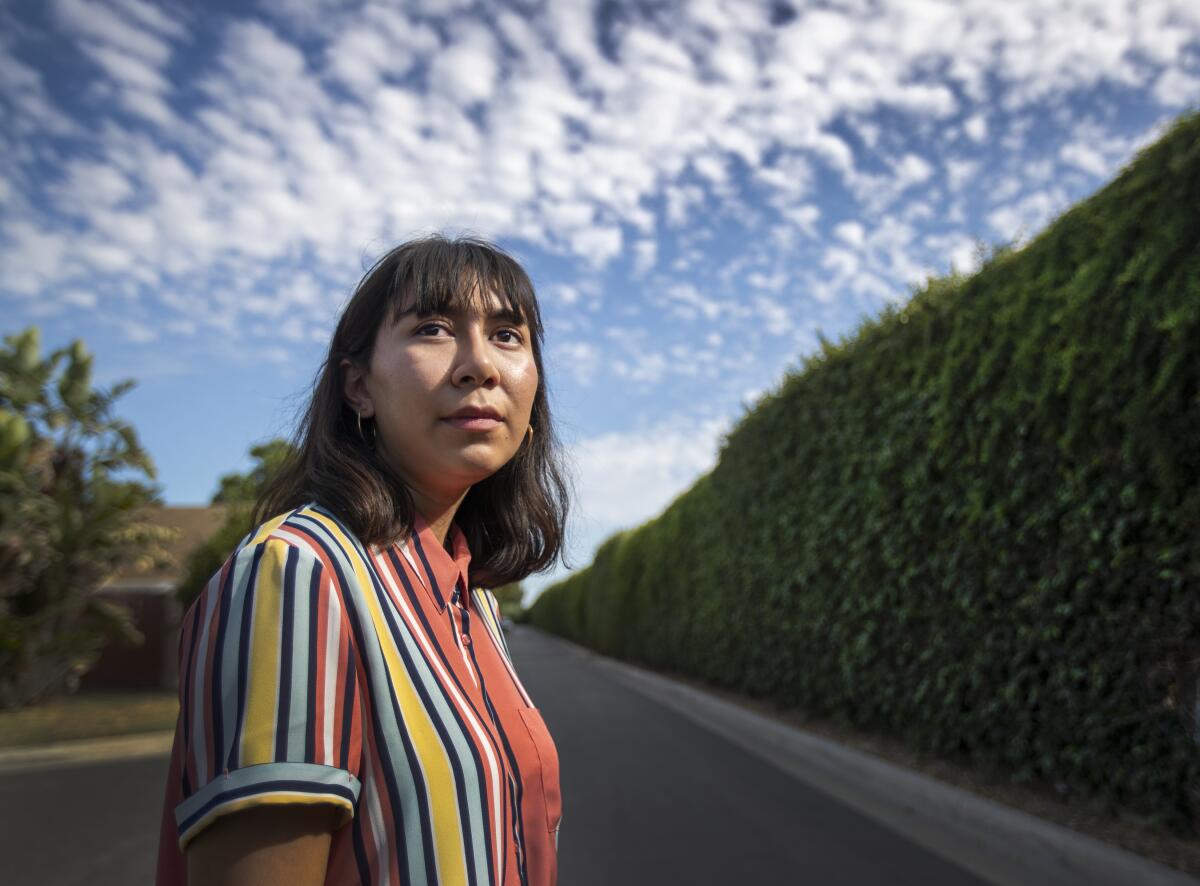
Contreras grew up in Downey and their parents still live there. They co-founded the Happy City Coalition to fight freeway widening, which they believe “should be seen as fiscal irresponsibility.”
The coalition has not endorsed any of Metro’s new project concepts. Contreras said the group has a lot of outstanding questions for the agency, but would look to support the best option that gets cars off the roads and funds much-needed public transit.
“We have the opportunity to reimagine how public transportation can look ... and, coming out of COVID, I really do think that there’s a lot of opportunity there,” they said. “I just hope we don’t squander it.”
Today’s top stories
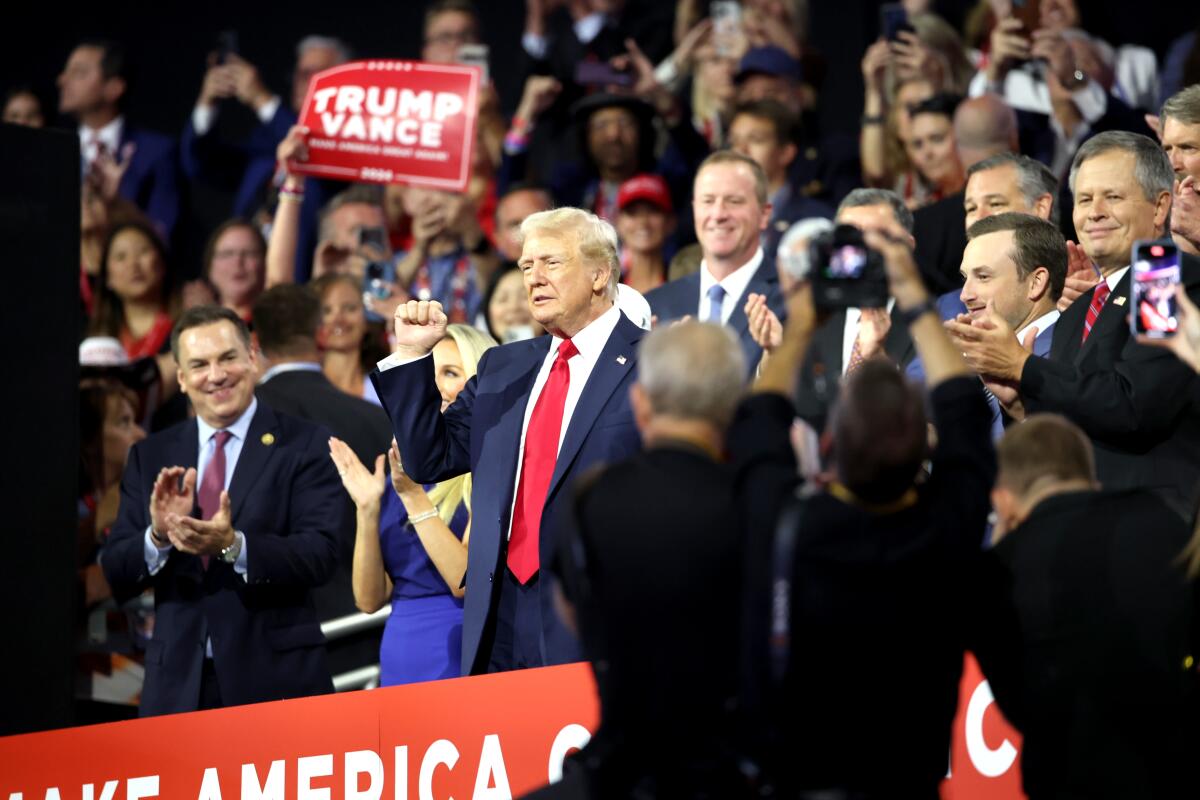
Trump accepts the Republican nomination
- Trump recounted his assassination attempt and outlined a grim portrait of America in his 92-minute acceptance speech.
- Here are 5 takeaways from the speech
- Some Silicon Valley investors are backing the Trump-Vance campaign.
The Sheriff Department
- A multi-year criminal investigation under former Los Angeles County Sheriff Alex Villanueva into the agency’s inspector general was based largely on unfounded accusations that state and federal prosecutors repeatedly turned down, documents reviewed by The Times show.
Entertainment industry unions
- Disneyland workers are participating in a strike authorization vote as contract negotiations with Disney continue.
- Hollywood crew members ratified a new IATSE contract
- What’s in the new IATSE deal? Wage increases, AI rules and more
Celebrity obituaries
- Bob Newhart, deadpan comedian who became a sitcom and movie star, has died at 94
- Lou Dobbs, veteran TV news host and conservative commentator, has died at 78.
The new transgender school law
- A conservative legal group filed a lawsuit against Gov. Gavin Newsom over the new transgender school law.
- Newsom signed the bill, which bans schools from notifying parents about student gender identity, this week.
- Pointing to the new law, Elon Musk wrote on his social media platform X that he is moving the headquarters of SpaceX from Hawthorne to Texas.
More big stories
- What’s in store for the Dodgers in the second half? Here are 10 storylines to watch.
- A widespread technology outage is disrupting flights, banks, media outlets and companies around the world.It’s a ‘generational moment’ for the Port of Los Angeles.
- More than 40 dogs, half of them dead, were found in Riverside County hoarder’s home, officials say.
- Rep. Maxine Waters seeks to stop ‘ridiculous’ $2-billion SoFi transit project ahead of Olympics.
Get unlimited access to the Los Angeles Times. Subscribe here.
Commentary and opinions
- Anita Chabria and Mark Z. Barabak: The GOP convention has been a split-screen experience, nasty and nice
- Editorial board: They changed the wording in party platform, but the GOP still wants to ban abortion.
- Steve Lopez: Perks of old age: Nobody says, ‘Grandpa, would you please move this refrigerator?’
- Michael Hiltzik: Who elected Elon Musk our arbiter of social norms?
Today’s great reads

‘We’re going to head into a civil war.’ Bill Baird, the ‘father’ of birth control, on the religious right and Supreme Court. If you’re thinking about what kind of birth control to use, you might want to thank Bill Baird — who won a Supreme Court decision that legalized contraception for unmarried women.
Other great reads
- Can chess games and toilet paper change prison culture? Inside San Quentin’s big experiment.
How can we make this newsletter more useful? Send comments to [email protected].
For your downtime
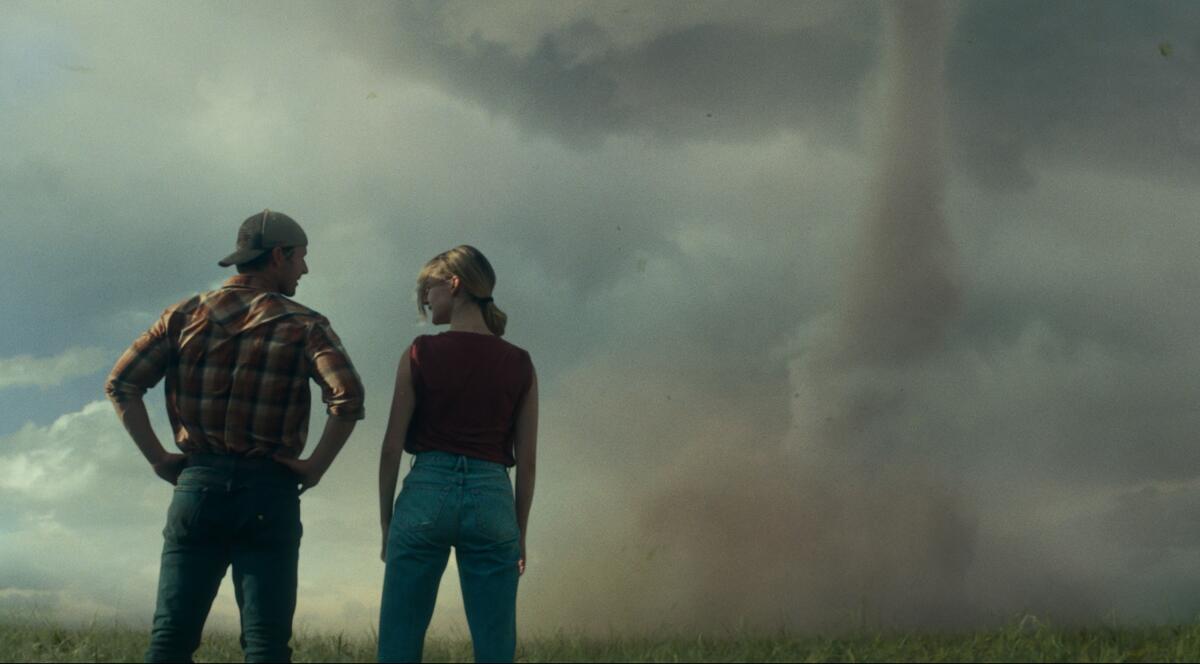
Going out
- 🎦 ‘Twisters’ chases a blockbuster storm of yesteryear — and may even outrun it
- 🎨 ‘Mozart Under the Stars,’ ‘Twisters,’ ‘Queer Rhapsody’ and the best culture L.A. has to offer this week
- 🍲 So many mysteries at Star Leaf. But mainly, where’s the spice?
Staying in
- 📺 ‘Those About to Die’ retreads blood-soaked ground of previous ancient Rome depictions
- 📺 ‘The Boys’ season finale depicts an assassination. The timing is coincidental, its showrunner says
- 🧑🍳 Here’s a recipe for Triple-Chocolate Brownies
- ✏️ Get our free daily crossword puzzle, sudoku, word search and arcade games.
And finally ... a great photo
Show us your favorite place in California! We’re running low on submissions. Send us photos that scream California and we may feature them in an edition of Essential California.

Today’s great photo is from L.A. Times staffer Myung J. Chun of the four-level interchange where the 110 and 101 freeways meet, with the L.A. skyline behind. Welcome to the city of freeways.
Have a great day, from the Essential California team
Ryan Fonseca, reporter
Christian Orozco, assistant editor
Karim Doumar, head of newsletters
Check our top stories, topics and the latest articles on latimes.com.
Sign up for Essential California
The most important California stories and recommendations in your inbox every morning.
You may occasionally receive promotional content from the Los Angeles Times.




